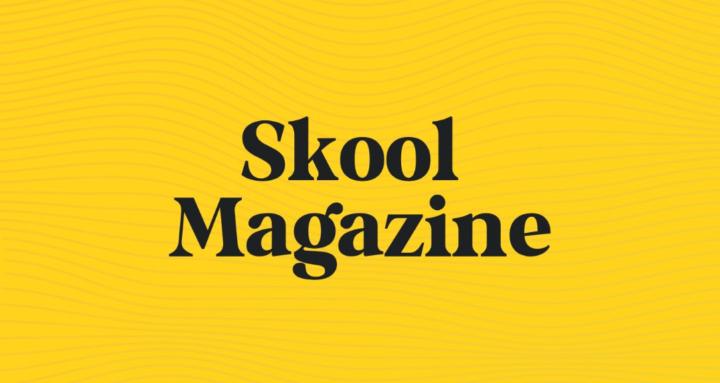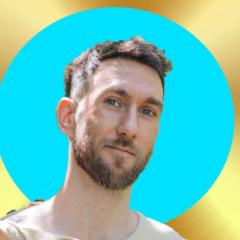Mar '25 • 🎙️ Podcasts
The Secret To Online Community Building In 2025
🎙️ Based on a podcast between William Renner and Matt Burns
In the dynamic world of online community building, Matt Burns has emerged as an insightful voice on the Skool platform created by Sam Ovens and popularized by Alex Hormozi. After leaving his corporate job at Monday(dot)com, just 50 days before this conversation, Burns has quickly positioned himself as someone who deeply understands the psychology behind successful community building and what it takes to monetize effectively in today's digital landscape.
I recently sat down with Burns to discuss the culture of Skool, the psychology of status in online communities, and the strategies that actually work for creating thriving digital spaces that generate sustainable income in an increasingly disconnected world.
𝐒𝐭𝐚𝐭𝐮𝐬: 𝐓𝐡𝐞 𝐇𝐢𝐝𝐝𝐞𝐧 𝐂𝐮𝐫𝐫𝐞𝐧𝐜𝐲 𝐨𝐟 𝐂𝐨𝐦𝐦𝐮𝐧𝐢𝐭𝐲 𝐁𝐮𝐢𝐥𝐝𝐢𝐧𝐠
When asked about the new affiliate features on Skool, Burns doesn't hesitate to identify the core human motivation at play. "What drives people, right? Let's take it out big picture. What drives humans to do anything? We have health, wealth... what do all those things really chunk up to? Status."
This focus on status as the underlying driver of human behavior provides a powerful framework for understanding community dynamics. "You want status with the people you care about, status from your peers," Burns explains. "Health, wealth, money, all of those things chunk up to this."
The affiliate program on Skool taps directly into this status economy, creating a system where members can increase their standing by bringing valuable new people into communities they believe in. It's a sophisticated approach that goes beyond simple referral mechanics.
"When you think about having a group where somebody that you really respect or look up to or just wanna be closer to... what's a great way to get somebody's attention? You bring in great community members to that community," Burns points out. This creates powerful feedback loops that benefit everyone involved when implemented correctly.
𝐍𝐚𝐯𝐢𝐠𝐚𝐭𝐢𝐧𝐠 𝐅𝐫𝐞𝐞 𝐚𝐧𝐝 𝐏𝐚𝐢𝐝 𝐂𝐨𝐦𝐦𝐮𝐧𝐢𝐭𝐲 𝐒𝐩𝐚𝐜𝐞𝐬𝐍𝐚𝐯𝐢𝐠𝐚𝐭𝐢𝐧𝐠 𝐅𝐫𝐞𝐞 𝐚𝐧𝐝 𝐏𝐚𝐢𝐝 𝐂𝐨𝐦𝐦𝐮𝐧𝐢𝐭𝐲 𝐒𝐩𝐚𝐜𝐞𝐬
One of the most challenging aspects of building on Skool is understanding the relationship between free and paid community spaces. Burns offers a refreshingly candid perspective on why many free communities fail to generate engagement or conversions.
"I've joined Skool communities that have 500, 5,000, 10,000 people and it is dead—like dead inside. And what does that do? Well, now I equate that with the creator not caring, and I think they have inherently lower status," he observes.
The problem, according to Burns, is that many creators see their free communities as mere stepping stones rather than valuable spaces in their own right. "I so often find that the free communities are kind of useless, and the reason why is because everybody is just driving to that end result instead of understanding that the free community should be an introduction."
Instead, he recommends a more intentional approach: "The free community could be the what; the paid community can be the how." This distinction, which Burns credits to Calvin Hollywood, provides a clear framework for community owners to deliver value at both levels without cannibalizing their paid offerings.
Burns suggests thinking about community tiers like educational grades. "Think about how we actually have schools set up around the world. You have kindergarten, first grade, second grade. Those are all different rooms, all different sections." This framework allows community owners to create appropriate spaces for members at different stages of their journey.
This more sophisticated understanding of community structure leads to practical advice: "When you look at posts in a paid community, for example, and it's just a basic question, delete that post, copy it for them and tell them, 'Hey, can you post this in the free community?'" Likewise, when someone asks advanced questions in a free space, that's the perfect opportunity to invite them to join your paid community.
𝐂𝐫𝐞𝐚𝐭𝐢𝐧𝐠 𝐌𝐞𝐚𝐧𝐢𝐧𝐠𝐟𝐮𝐥 𝐄𝐧𝐠𝐚𝐠𝐞𝐦𝐞𝐧𝐭 𝐁𝐞𝐲𝐨𝐧𝐝 𝐒𝐨𝐜𝐢𝐚𝐥 𝐌𝐞𝐝𝐢𝐚
One of the most striking insights Burns shares is about the quality of engagement that distinguishes true communities from social media experiences. He notes that many community owners struggle to generate meaningful interaction beyond surface-level responses.
"When I go to something on Skool and I see fire emoji, I see cheering gif... I don't see any actual comments. Those are the things where I'm just turned off," Burns explains. "This isn't social media. You don't want just thumbs up or smiley face or whatever. You want people to actually engage and comment."
The key to fostering deeper engagement, according to Burns, is making your community the expert rather than positioning yourself as the guru with all the answers. "When you come in as the expert, you shut down conversation. When you come and ask for help with something that is in the area where people could say, 'Oh, I know,' they're thinking, 'Oh, he's asking for help, she's asking for help. Of course, I want to increase my status with them and help them do it.'"
This approach changes the dynamic from broadcast to conversation, creating opportunities for authentic engagement that traditional social media simply can't match. "The best creators aren't going out and telling you, 'Value post, do this, do that, achieve these things.' The best creators are the ones that inspire the right kind of conversation."
𝐓𝐡𝐞 "𝐓𝐡𝐢𝐫𝐝 𝐏𝐥𝐚𝐜𝐞" 𝐢𝐧 𝐚 𝐃𝐢𝐬𝐜𝐨𝐧𝐧𝐞𝐜𝐭𝐞𝐝 𝐖𝐨𝐫𝐥𝐝
Perhaps the most powerful insight from our conversation came when Burns talked about the sociological concept of "third places" and how Skool is filling a critical void in modern society.
"There's this concept of the first place, the second place, and the third place," Burns explains. "The first place is generally your home. The second place is where you work, which has also been compromised because a lot of people are working remotely. And then there's that third place where you go with no expectations of anything. You just get to be yourself and be around the kind of people that you wanna be around."
This analysis helps explain why Skool feels different from other platforms—it's creating digital "third places" in a world where physical ones have been disappearing for decades. "People are only getting lonelier," Burns notes. "A Gallup survey of over 142 different countries basically equated to half of all adults feeling social isolation. Fifteen cigarettes a day is the equivalent of that level of physical damage."
The beauty of Skool, according to Burns, is that it allows users to both find existing communities that serve as their third place or create entirely new spaces if they don't find what they're looking for. These communities don't always need to be business-focused; they can be centered around shared interests, hobbies, or simply spaces for authentic human connection.
𝐌𝐨𝐧𝐞𝐭𝐢𝐳𝐚𝐭𝐢𝐨𝐧 𝐓𝐡𝐫𝐨𝐮𝐠𝐡 𝐀𝐮𝐭𝐡𝐞𝐧𝐭𝐢𝐜 𝐕𝐚𝐥𝐮𝐞 𝐂𝐫𝐞𝐚𝐭𝐢𝐨𝐧
Despite the focus on deeper human connection, Burns doesn't shy away from discussing monetization. Rather, he reframes it in a more authentic context: "Human attention, and people's respect of you and your status, that's how you monetize without losing your soul."
Burns' approach to helping creators monetize on Skool involves identifying their specific bottlenecks and creating tailored solutions. He shares the example of a YouTuber named Frey Chu who had 5,000 subscribers but wasn't sure about launching a community. "Within like a week and a half, he had over 800 people in it," Burns shares. "We were able to shorten that gap from what could have been hundreds of hours down to three."
This focus on solving real problems rather than applying one-size-fits-all formulas exemplifies Burns' approach to community building. "My obsession with community building is really coming forward," he explains, driven by the belief that "the ability to create, build, manage, run a community is gonna be the most valuable thing that anybody could have here going over in the future."
𝐀𝐮𝐭𝐡𝐞𝐧𝐭𝐢𝐜𝐢𝐭𝐲 𝐚𝐬 𝐚 𝐂𝐨𝐦𝐩𝐞𝐭𝐢𝐭𝐢𝐯𝐞 𝐀𝐝𝐯𝐚𝐧𝐭𝐚𝐠𝐞
Throughout our conversation, Burns returns to themes of authenticity and directness as powerful tools for community builders. "When I think about the people who have given me so much that I am just like, 'I will fight for you, I love your mission, I believe in what you're doing,' those people that inspire that for me—they are the people that gave me something that I felt I should have paid for."
This approach to giving generously without immediate expectation of return creates powerful loyalty and word-of-mouth growth. "The best way for you to be growing your status as a creator, as somebody who cares about a personal brand right now, is to just give relentlessly. It is not a silver bullet. It is not a secret."
Burns even applies this philosophy to cold outreach, focusing on human connection rather than automated sequences. "What I've changed to doing is actually going in, trying to be as human as possible, and reaching out to these people who have never heard of me before and just saying, 'I think you have this problem. Here's what that solution looks like. Raise your hand if you're interested.'"
The results speak for themselves: "Multiple people now that I've asked, I was like, 'Why are you working with me? Like, I just emailed you out of the blue.' And what came out—they all said the same thing: 'I could tell that you were a person. I could tell that you were a human being and you just really sounded genuine, like you wanted to talk about this, that you care.'"
𝐅𝐢𝐧𝐚𝐥 𝐓𝐡𝐨𝐮𝐠𝐡𝐭𝐬
Throughout our conversation, Matt Burns repeatedly returns to themes of authenticity, meaningful engagement, and the power of status as currency in digital communities. In an online landscape often dominated by automation and algorithmic engagement, his approach offers a refreshingly human-centered alternative focused on creating genuine value.
"The cool thing about communities is that a loyal and understanding community is going to be the highest leveraged, highest valued thing you could possibly have in the future," he concludes. "It is gonna be the premium asset."
As Skool continues to evolve as a leading platform for community building, Thompson's insights serve as a valuable roadmap for those looking to create digital spaces where authentic connection translates into sustainable success and reliable income generation in an increasingly disconnected world.
24
9 comments

skool.com/magazine
Articles, videos, reviews, & podcasts from some of the coolest communities on Skool 😎
Powered by
